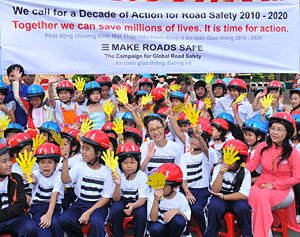World Health Day provides a timely reminder that more needs to be done to ensure good health for all. In developing countries where people may not be aware of the causes of poor health, the need for health education and awareness is greater than ever.
In the Pacific region 'life style diseases' such as cancer, diabetes and cardio vascular disease have become leading causes of death. Since 2007 Australia has been working in the region to address the growth of these diseases and reduce exposure to risk factors such as tobacco, inactivity, poor diet and harmful use of alcohol.
In Tonga, the Australian Government is working with the Tonga Heath Promotion Foundation to establish the Healthy Tonga initiative which promotes healthy lifestyle activities.
In the Cook Islands, the implementation of the Avarua Health Promoting School Program has seen a decrease in the percentage of overweight students in just one year.
In Vanuatu the Physical Activity Policy Walk for Life campaign has resulted in an increase in the number of civil servants participating in physical activities.
In Vietnam, road traffic injuries are the leading cause of death for those aged 15-29 years. In December 2007, the Government of Vietnam made helmet wearing compulsory on Vietnam's roads, increasing compliance from 3 per cent to more than 95 per cent. Australia contributed funding towards the Wear a Helmet – No Excuses campaign and a new helmet campaign targeting children.
The Australian Government recognises the enormous challenge of improving maternal health. Progress has been slow in this area, but there have been some significant improvements. For example in Cambodia, 64 per cent of births are attended by trained health staff now compared to just 39 per cent three years ago.
World Health Day 2010 events are being organised worldwide during the week of April 7 to 11 under the campaign 1000 cities, 1000 lives,
The global goals of the campaign are:
- 1000 cities: to open up public spaces to health, whether it be activities in parks, town hall meetings, clean-up campaigns, or closing off portions of streets to motorized vehicles.
- 1000 lives: to collect 1000 stories of urban health champions who have taken action and had a significant impact on health in their cities.
More information:

